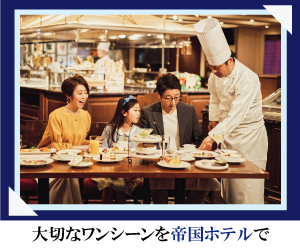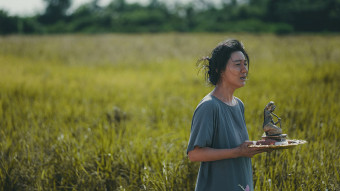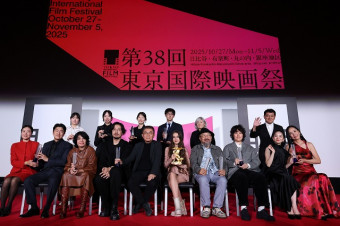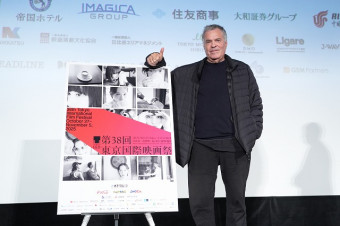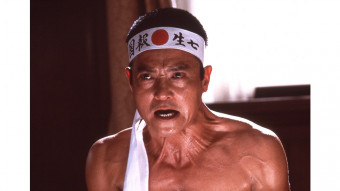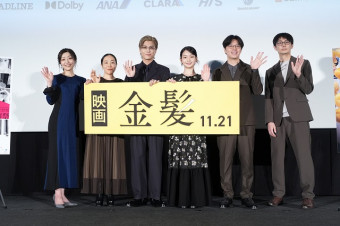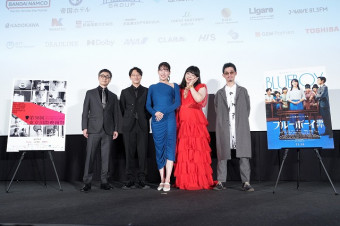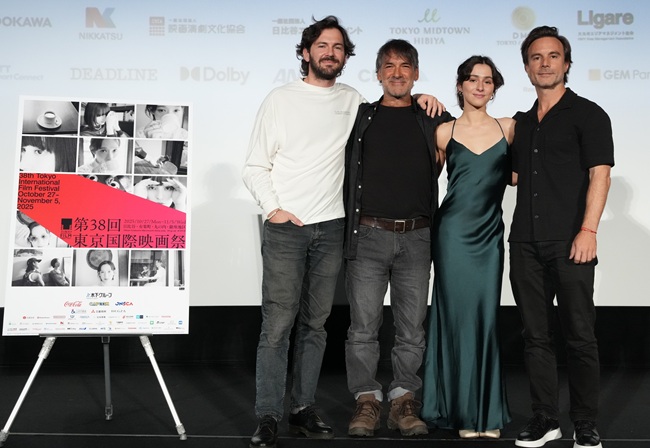
The Competition section of the 38th Tokyo International Film Festival has many movies about mothers who are alive, but the Portuguese feature Maria Vitória, which had its world premiere at the festival on November 1, is about the loss of a mother. During a post-screening Q&A, director Mário Patrocínio revealed that the story was inspired by the death of his own mother. “When I was writing the screenplay,” he said, “I felt that there was something missing. My mother had just passed away, so I used her name for the title character. By doing so it gave me extra strength to connect with the protagonist and made it easier to explore her life.”
The connection became so inextricable that the movie itself became a study of how a family overcomes tragedy, even when it happens years earlier. Maria Vitória focuses on a family in a mountain town that seems to be plagued by forest fires, which killed the matriarch some years ago. Subsequently, the eldest son, Bruno, has departed in a bitter split from his father, who then lavishes all his attention on his daughter, Maria Vitória, who is a local soccer star, holding down the goalie position for her high school team, where she’s the only female member. Her fiercely proud father is determined that she will go pro right after graduation, which, as the story opens, is about a week away.
The actors who play the husband, son, and daughter of the deceased mother in the movie were also onstage with Patrocínio, during the Q&A. The TIFF screening was the first opportunity they had to see the completed movie. Noted the director: “I brought my father, sister and brother here to Tokyo with me to honor my mother’s memory.”
Mariana Cardoso, who played the title character, admitted, “I’m still processing it.” She seemed to be having a hard time keeping her emotions in check.
The movie is a very emotional ride, since Bruno’s return to the town as a kind of prodigal son is fraught with guilt and hard feelings. His father seems to blame him for his mother’s death, and Bruno thinks his father is driving his sister crazy with his obsession over her prospects as a soccer star. Consequently, as he tries to rekindle relationships that have gone cold since his departure, he helps Maria enjoy at least a little of her girlhood before she’s pushed fully into the cynical world of adults.
“Family is a universal topic,” said Cardoso. “Our families are the people who let us be ourselves, usually because they’re always around. I related to the movie deeply, and I think many people will. That’s because all the actors, as well as the crew, brought their vulnerability to the set every day. That’s what made it easier to do.”
“During the auditions we were trying to discover the characters,” said Miguel Nunes, who plays Bruno. “When I met Mariana, I found we could listen to each other as our characters all the way until the end. And I had to admire Miguel [Borges], because he never just conformed to the scene. He always knew we could go further. That’s because Mário insists on rehearsals, which are not that common in Portuguese cinema. We were able to explore these characters fully. I’m from the theater, and that helped me prepare for the cinema by showing me how to work in 3 dimensions.”
Borges added to the praise for Patrocínio. “This movie is an amazing love letter to his mother, very poetic and fragile. As a director, he always says the right thing at the right moment and never cuts into the work of an actor.”
One Portuguese speaker in the audience wanted to know why the director focused so much on women in the movie, since her experience was that Portuguese movies usually have male protagonists. “Women are my inspiration,” said Patrocínio. “I have always observed them and learned from them. Though my grandmothers and my mother are not around anymore, I still feel their presence. I saw how they navigated a society dominated by men, and it had a profound effect on me. They address society with love. With men, it seems we’re always at war.”
The moderator, Yasuda Yuko, pointed out that Patrocínio had spent a short portion of his childhood in Japan, where he actually attended a Japanese elementary school. The audience, of course, wanted to know more.
“What can I say? It seems Japan still values those things that are really important in life,” he said. “In Europe, we’re losing that. I think those core values still exist here, and it’s not just that Japanese society is well organized. I can definitely say my short time in Japan changed my life, the way it formed my view of the world. On this trip, I feel like I’m coming home.”
Q&A Session: Competition
Maria Vitoria
Guests: Mário Patrocínio(Director/Screenplay), Mariana Cardoso(Actor), Miguel Borges(Actor), Miguel Nunes(Actor)




















